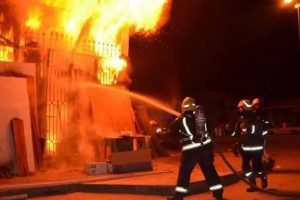 At around 11 pm on 23 April, Muslim fundamentalists in al-Fawakher village, 250 km south of Cairo, launched an attack on local Copts following a rumour that they were planning to build a church. The attackers hurled stones and set fire to Christians’ houses and shops, destroying several properties. Coptic news source Watani reported that the Muslims’ angry cries could be heard along with the terrified screams of Coptic women and children. Video footage of the attack was widely shared on social media by the attackers accompanied by celebratory music.
At around 11 pm on 23 April, Muslim fundamentalists in al-Fawakher village, 250 km south of Cairo, launched an attack on local Copts following a rumour that they were planning to build a church. The attackers hurled stones and set fire to Christians’ houses and shops, destroying several properties. Coptic news source Watani reported that the Muslims’ angry cries could be heard along with the terrified screams of Coptic women and children. Video footage of the attack was widely shared on social media by the attackers accompanied by celebratory music.
Bishop of Minya Anba Makarius posted on X: “I am following with great concern the extremists’ attack taking place now on the homes of the Copts in the village of al-Fawakher in Minya, burning a large number of homes and preventing their residents from leaving. We have informed the relevant officials of the attack, and they have promised us to take all necessary action; we are confident of their prompt response.”
Local police and firefighters, led by Minya’s deputy governor and the head of its police department, contained the situation and no fatalities were reported. They cordoned off the village and its streets, put out fires, arrested a number of perpetrators and police launched an investigation into the instigators of the violence, including those who spread rumours online about plans to build a church and used social media to rally the attack.
In the early hours of 24 April Anba Makarius posted: “Security forces have arrived and taken control of the situation. They arrested the instigators and perpetrators, and are tallying the damage inflicted. State authorities will compensate those affected by the damage, and will hold the perpetrators accountable.”
International Christian Concern (ICC) reported that the attack took place after word spread that residents of the village, which is home to 3,000 Christian families, had obtained a permit to construct a church building. Some Christians reportedly received threats after the permit was issued, prompting Anba Makarios to alert the authorities. ICC stated that the attack went ahead despite promises of safety from security forces and said extremists later shared a video on social media showing Coptic homes on fire as a song praising the attack played in the background.
Second attack three days later
On 26 April an extremist mob attacked the construction site of a new evangelical church in Minya’s Al-Kom Al-Ahmar village, destroying the foundations and sewage system. Construction had begun on 22 April, with a police presence on the site.
The attack took place after Friday prayers and the mob also attacked homes and properties belonging to Christians in the village, although no one was hurt. Local police needed reinforcements from neighbouring towns and villages to help contain the situation; once they had stopped the violence they arrested several attackers.
Advocacy group Copts United stated: “The security forces moved to the village, and the situation was brought under control and a number of the perpetrators were arrested. One of the village’s Copts said that the evangelical church in the village obtained an official building permit, which angered a number of extremists.”
Christian Solidarity Worldwide reported that Christians in the village had obtained all the necessary paperwork and permissions to build the church, which was intended to serve more than 2,000 evangelical Christians in the area.
Background
Persecution of Christians persists in Upper Egypt, despite the actions of President Sisi and the Egyptian authorities to fight extremism and support the Christian community. Islamist extremists often attack Christians whom they suspect of constructing or repairing church buildings.
For decades it was almost impossible to obtain permits to construct new church buildings or repair existing ones but in 2016 the Egyptian parliament passed the Law for Building and Restoring Churches to make it quicker and easier to obtain permits and to make provision for legalising Egypt’s approximately 5,000 unlicenced church buildings (including around 3,000 Coptic Orthodox churches).
Some 3,730 churches applied for permits and since then the cabinet committee tasked with processing applications has issued permits to 3,160 of these churches and affiliated service buildings.
Read more about the situation of Egyptian Christians in Church in Chains’ Egypt Country Profile.
(Christian Daily, Christian Solidarity International, Christian Solidarity Worldwide, Copts United, International Christian Concern, Watani)
Image: Christen in Not.
